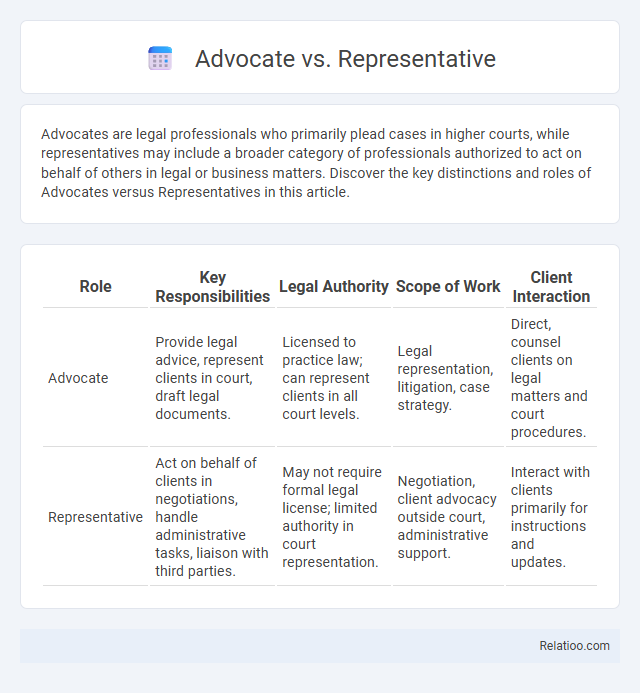Advocates are legal professionals who primarily plead cases in higher courts, while representatives may include a broader category of professionals authorized to act on behalf of others in legal or business matters. Discover the key distinctions and roles of Advocates versus Representatives in this article.
Table of Comparison
| Role | Key Responsibilities | Legal Authority | Scope of Work | Client Interaction |
|---|---|---|---|---|
| Advocate | Provide legal advice, represent clients in court, draft legal documents. | Licensed to practice law; can represent clients in all court levels. | Legal representation, litigation, case strategy. | Direct, counsel clients on legal matters and court procedures. |
| Representative | Act on behalf of clients in negotiations, handle administrative tasks, liaison with third parties. | May not require formal legal license; limited authority in court representation. | Negotiation, client advocacy outside court, administrative support. | Interact with clients primarily for instructions and updates. |
Introduction: Understanding Advocate and Representative
Advocate and Representative serve distinct roles in legal and social contexts, with an Advocate specializing in defending and promoting your rights, often in court or public forums, while a Representative acts on your behalf in negotiations, decision-making, or administrative processes. Both roles involve advocacy, which is the act of supporting or recommending a cause or policy to influence outcomes. Understanding these differences helps you choose the right support for your specific needs and objectives.
Defining an Advocate
An advocate is an individual who actively supports or argues in favor of a specific cause, person, or group, often using persuasive communication and action to influence decisions or policies. Unlike a representative, who formally acts on behalf of another in official or legal matters, an advocate operates more broadly to promote social, legal, or political change. Your role as an advocate involves championing rights and interests through direct engagement, education, and mobilization to create meaningful impact.
Defining a Representative
A representative is an individual authorized to act on behalf of another person or group, often in legal, political, or business contexts, ensuring their interests and rights are protected and voiced. Unlike an advocate, whose role emphasizes support and argumentation for a cause or individual, a representative's duties include legally binding decisions and formal negotiations. Your choice of a representative directly impacts the effectiveness and legitimacy of your interests in formal proceedings.
Key Roles and Responsibilities
Advocates actively support and defend the interests or rights of individuals or groups, often specializing in legal or social justice issues. Representatives act on behalf of others, making decisions and conveying messages in political, business, or organizational contexts to reflect their constituents' or clients' interests. Advocacy involves the strategic effort to influence public policy or opinions, organize campaigns, and amplify marginalized voices by mobilizing resources and stakeholders.
Core Differences Between Advocate and Representative
An advocate specifically supports and defends a person or cause, often with legal or social justice implications, while a representative acts on behalf of a group, organization, or individual in official or formal capacities. Advocacy involves the active process of supporting or recommending a cause, typically requiring expertise and a commitment to influencing decisions. Your choice between an advocate and a representative depends on whether you need dedicated support for a particular issue or a formal voice in decision-making processes.
Skills Required for Advocates and Representatives
Advocates require strong communication, negotiation, and critical thinking skills to effectively present cases and influence decisions in legal or social contexts. Representatives need interpersonal skills, problem-solving abilities, and an understanding of their constituents' needs to act on their behalf in political, corporate, or community settings. Both roles demand emotional intelligence and the capacity to build trust, while advocacy emphasizes active campaigning and public speaking skills to promote specific causes or policy changes.
Real-World Examples: Advocates vs Representatives
Advocates actively support and promote specific causes or individuals, such as patient advocates who help navigate healthcare systems to ensure patients receive proper treatment. Representatives primarily serve as delegates or spokespeople, like elected officials representing their constituents' interests in legislative bodies. Advocacy encompasses the broader practice of influencing policies or decisions, often demonstrated by grassroots organizations lobbying for environmental reforms.
Advantages and Limitations of Each Role
Advocates offer specialized legal expertise and can directly influence judicial decisions, yet their scope is limited to legal contexts and formal procedures. Representatives provide a broader range of support by acting on your behalf in negotiations and administrative matters but may lack the legal authority to represent you in court. Advocacy focuses on promoting your rights and interests, empowering you through education and support, though it may not always lead to immediate legal resolutions or enforceable outcomes.
When to Choose an Advocate or a Representative
Choose an advocate when you need someone to actively support and argue on your behalf, especially in legal, social, or health-related matters requiring specialized knowledge and passionate representation. Opt for a representative if your goal is to have a designated individual act as your official agent or spokesperson, often in formal or administrative contexts such as business negotiations or legislative affairs. Understanding Your specific needs ensures you select the right role to effectively promote and protect your interests.
Conclusion: Making the Right Choice
Choosing between an advocate, representative, and advocacy depends on the context and objectives; advocates actively support specific causes or individuals, while representatives serve as official delegates or agents acting on behalf of others. Advocacy encompasses the broader practice of championing rights, policies, or interests, often involving both advocates and representatives. Understanding these distinctions ensures selecting the right approach for effective influence and desired outcomes.

Infographic: Advocate vs Representative
 relatioo.com
relatioo.com